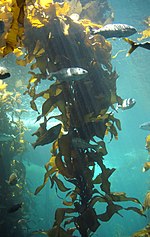Yellow-green algae or the Xanthophyceae (xanthophytes) are an important group of heterokont algae. Most live in fresh water, but some are found in marine...
18 KB (1,595 words) - 23:03, 18 October 2023
Chartreuse (color) (redirect from Yellow-Green)
started producing Chartreuse liqueur in 1737. Yellow-green algae, also called Xanthophytes, are a class of algae in the Heterokontophyta division. Most live...
10 KB (748 words) - 03:22, 21 October 2024
The green algae (sg.: green alga) are a group of chlorophyll-containing autotrophic eukaryotes consisting of the phylum Prasinodermophyta and its unnamed...
27 KB (2,663 words) - 17:15, 26 October 2024
Stramenopiles. Genetic studies show their closest relatives to be the yellow-green algae. Brown algae exist in a wide range of sizes and forms. The smallest members...
59 KB (5,867 words) - 02:48, 21 November 2024
Protists in the fossil record (section Green algae)
apicomplexans, most ciliates, some green algae (the Klebsormidiales), choanoflagellates, oomycetes, brown algae, yellow-green algae, Excavata (e.g., euglenids)...
70 KB (7,729 words) - 07:09, 4 January 2024
Cyanobacteria (redirect from Blue-green algae)
(kúanos) 'blue') refers to their bluish green (cyan) color, which forms the basis of cyanobacteria's informal common name, blue-green algae, although as prokaryotes...
180 KB (17,735 words) - 17:20, 13 November 2024
Vaucheria is a genus of Xanthophyceae or yellow-green algae known as water felt. It is one of only two genera in the family Vaucheriaceae. The type species...
8 KB (849 words) - 18:41, 15 April 2024
Bacillariophyceae (diatoms), and Xanthophyceae (yellow-green algae) together. E.g., Pascher (1914). Chrysophyceae (golden algae) E.g., Margulis et al. (1990). Chrysophyta...
2 KB (165 words) - 19:34, 14 January 2022
ways. Green algae are a prominent examples of algae that have primary chloroplasts derived from endosymbiont cyanobacteria. Diatoms and brown algae are...
92 KB (10,575 words) - 12:12, 19 November 2024
Symbiosis in lichens (section Green algae)
belonging to the Chlorophyta (green algae) or to the Xanthophyta (yellow-green algae). About 90% of all known lichens have a green alga as a symbiont. Among...
12 KB (1,445 words) - 03:22, 27 October 2024
capable of kleptoplastic photosynthesis via endosymbiosis with ingested yellow-green algae. Almost all aquatic animals reproduce in water, either oviparously...
22 KB (2,322 words) - 08:39, 22 November 2024
Tribonema is a genus of filamentous, freshwater yellow-green algae. The holotype for the genus is the species Tribonema bombycina (C.Agardh) Derbès & Solier...
1 KB (127 words) - 15:43, 11 April 2024
these algae are most typically pink, or some other shade of red, but some species can be purple, yellow, blue, white, or gray-green. Coralline algae play...
33 KB (3,667 words) - 13:51, 24 October 2024
Lichen (redirect from Yellow reindeer moss)
can also use yellow-green algae (Heterococcus) as their symbiotic partner. Lichens independently emerged from fungi associating with algae and cyanobacteria...
132 KB (14,357 words) - 17:33, 11 November 2024
Vaucheria litorea is a species of yellow-green algae (Xanthophyceae). It grows in a filamentous fashion (forming long tubular cells connected end to end)...
15 KB (1,742 words) - 02:15, 19 December 2023
Chloroplast (redirect from Green algal derived chloroplast)
includes diatoms, brown algae (seaweeds), and golden algae (chrysophytes)— and Xanthophyceae (also called yellow-green algae). Heterokont chloroplasts...
189 KB (19,143 words) - 04:06, 11 November 2024
belonging to the Chlorophyta (green algae) or to the Xanthophyta (yellow-green algae). About 90% of all known lichens have a green alga as a symbiont, and among...
13 KB (1,577 words) - 08:30, 25 July 2024
Ochrophyte (section Harmful algae)
classes. In lotic habitats (rivers, streams), golden algae (Chrysophyceae) and yellow-green algae (Xanthophyceae) are common and occasionally abundant...
41 KB (4,136 words) - 18:52, 16 October 2024
Sphacelaria, and many others. Yellow-green algae can also be found in brackish marshes. Yellow-green algae are eukaryotic algae in the class Xanthophyceae. An example...
22 KB (2,457 words) - 23:02, 29 October 2023
Powder Blue Tang Yellow Tang Hermit crabs and other species of crabs eat algae. Crabs eat green algae, film algae, red slime algae, diatoms, cyanobacteria...
10 KB (944 words) - 15:40, 22 September 2024
carotenoids and typically help give the snow algae cells their visible colors. Primary carotenoids, such as the yellow xanthophyll, are typically used in low...
13 KB (1,419 words) - 17:40, 8 October 2024
Heterokontophyta Bacillariophyceae (Diatomea algae) Eukaryote SAR (clade) Heterokontophyta Xanthophyceae (Yellow-green algae) Eukaryote Alveolata (clade) Ciliophora...
24 KB (2,670 words) - 14:30, 4 October 2024
Characiopsis is a genus of yellow-green algae in the family Characiopsidaceae. Borzì, A. (1895). Studi algologici: saggio di richerche sulla biologia delle...
2 KB (86 words) - 05:41, 10 September 2024
Chlorophyta (from Greek chloros 'yellow green' and phyton 'plant') is a division of green algae informally called chlorophytes. Chlorophytes are eukaryotic...
48 KB (4,809 words) - 03:12, 11 November 2024
Biological pigment (section Pigments in algae)
majority of green. It is the presence and relative abundance of chlorophyll that gives plants their green color. All land plants and green algae possess two...
32 KB (3,908 words) - 20:24, 18 April 2024
photobiont partners have been recorded, mostly green algae, but also brown algae and yellow-green algae. The family, circumscribed nearly two centuries...
83 KB (6,743 words) - 09:20, 4 October 2024
host for Aphelidium tribonemae the yellow-green algae Tribonema gayanum. Another observed host is the yellow-green algae Botridiopsis intercedens. These...
11 KB (1,272 words) - 23:10, 11 November 2024
Chlorophyll (redirect from Leaf green)
scales Chlorophyll is any of several related green pigments found in cyanobacteria and in the chloroplasts of algae and plants. Its name is derived from the...
35 KB (3,602 words) - 15:50, 19 November 2024
1977; however, that name was taken by a genus of algae in the Xanthophyceae (the yellow-green algae). Therefore, the genus was renamed to Chlorotetraedron...
3 KB (284 words) - 20:12, 2 December 2023
Botrydiaceae is a family of yellow-green algae comprising 13 species in three genera. It is the only family in the order Botrydiales. Guiry, M.D.; Guiry...
1,008 bytes (47 words) - 14:56, 11 April 2024



























